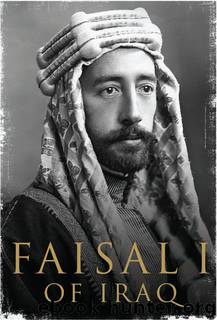Faisal I of Iraq by Ali A. Allawi

Author:Ali A. Allawi
Language: eng
Format: epub
ISBN: 9780300127324
Publisher: Yale University Press
Faisal asked Curzon for a day to reflect on the matter and to give his final answer. ‘I could not sleep a wink that night, and spent all night thinking about this dangerous issue … I asked myself: should I accept the throne of Iraq, even though the throne of Iraq is in my brother's right, or should I refuse? If I accepted the crown my brother would consider it an affront to his rights. On the other hand I told myself that my rejection of the offer would result in the loss of Iraq to the Hashemites and the isolation of the family from the possibility of serving the Arab cause. I met with Lord Curzon again on the third day and told him my acceptance of what was offered me. God knows that I only wanted what is good for the whole of the Arab nation and I did not seek any personal gain.’31
The outlines of Churchill's new policy in the Middle East were becoming clear by February 1921. It was premised on two main considerations. The first was to base the preservation of British primacy and control in the Middle East through the notion of indirect rule rather than direct government. In practice this meant supporting Faisal for the throne of Iraq, and ‘Abdullah in Transjordan, and relying on their alliances as the cornerstones of British policy. In this way, British interests would be preserved by friendly princes who would be kept dependent and beholden to British advisers. The second consideration was motivated primarily by costs: how to maintain stability and security in Iraq without the huge outlays that would be incurred by a large military presence. The revolt in Iraq had cost the British Treasury nearly £40 million – a staggering sum in 1920 – and a very great deal more than what Britain had spent on supporting the Arab Revolt. The prospects of maintaining a large army in Iraq was something that Churchill knew would be a source of continuous contention with the Treasury and would not be supported by an increasingly critical parliament and public. Churchill's solution was to rely on the Royal Air Force (RAF) to provide the essential security for establishing a viable state in Iraq. A few strategically located bases would be enough, so Churchill thought, to enforce control throughout the country. Hugh Trenchard, the chief of air staff, fully concurred with the plan. Revolts of tribesmen, the greatest source of instability in Iraq, could be subdued by aerial bombing, and the RAF could patrol the lines of communications and supply without the need for large numbers of ground troops. To put the final touches to his Middle Eastern grand plan, Churchill called for a meeting in Cairo of all of Britain's experts and senior administrators involved in Arab affairs.
A great deal of preparatory work had gone to ensure that the Cairo conference would reach the desired conclusions. Churchill himself did not take up his new post at the Colonial Office until 14 February 1921.
Download
This site does not store any files on its server. We only index and link to content provided by other sites. Please contact the content providers to delete copyright contents if any and email us, we'll remove relevant links or contents immediately.
| Military | Political |
| Presidents & Heads of State | Religious |
| Rich & Famous | Royalty |
| Social Activists |
Waking Up in Heaven: A True Story of Brokenness, Heaven, and Life Again by McVea Crystal & Tresniowski Alex(37812)
Empire of the Sikhs by Patwant Singh(23086)
We're Going to Need More Wine by Gabrielle Union(19046)
Hans Sturm: A Soldier's Odyssey on the Eastern Front by Gordon Williamson(18592)
Leonardo da Vinci by Walter Isaacson(13337)
The Radium Girls by Kate Moore(12029)
Tools of Titans by Timothy Ferriss(8396)
Educated by Tara Westover(8054)
How to Be a Bawse: A Guide to Conquering Life by Lilly Singh(7486)
Permanent Record by Edward Snowden(5848)
The Last Black Unicorn by Tiffany Haddish(5636)
The Rise and Fall of Senator Joe McCarthy by James Cross Giblin(5281)
Promise Me, Dad by Joe Biden(5154)
The Wind in My Hair by Masih Alinejad(5095)
A Higher Loyalty: Truth, Lies, and Leadership by James Comey(4964)
The Crown by Robert Lacey(4817)
The Iron Duke by The Iron Duke(4356)
Joan of Arc by Mary Gordon(4113)
Stalin by Stephen Kotkin(3969)
